General Discussion
Related: Editorials & Other Articles, Issue Forums, Alliance Forums, Region ForumsA Jimmy Carter Appreciation Thread
So I ran a poll today on the three living Democratic Presidents.
http://www.democraticunderground.com/10023341177
Now, nobody is claiming the poll is scientific, but (so far) about 65% of those who have responded have chosen James Earl Carter as the best of the three living Democratic Presidents.




Some Carter trivia...
Jimmy Carter was the first President born in a hospital.
Carter is the only U.S. president to have lived in housing subsidized for the poor.
He is both a Son of the Revolution and a Son of the Confederacy
He once filed a UFO citing, and he once appeared on "What's My Line?"
http://en.wikipedia.org/wiki/Jimmy_carter
So what is it that you love about the peanut farmer from plains?
Dawson Leery
(19,348 posts)Even today, we are still having trouble convincing Americans to look for a life beyond blind consumption.
Electric Monk
(13,869 posts)newfie11
(8,159 posts)To bad many were made fun of or distroyed.
hrmjustin
(71,265 posts)MannyGoldstein
(34,589 posts)A great man and a good man. So rare.
NRaleighLiberal
(60,019 posts)adirondacker
(2,921 posts)limpyhobbler
(8,244 posts)Habitat for Humanity, international election monitoring, recent public statement that we don't have a functioning democracy, etc.
Just Saying
(1,799 posts)Arctic Dave
(13,812 posts)Imagine the world we could be living in if we followed his advice.
rhett o rick
(55,981 posts)Mnemosyne
(21,363 posts)mokawanis
(4,452 posts)Among other health projects, Carter has worked to eradicate the Guinea worm.
http://www.cartercenter.org/index.html
"Former U.S. President Jimmy Carter tries to comfort 6-year-old Ruhama Issah at Savelugu (Ghana) Hospital as a Carter Center technical assistant dresses Issah's extremely painful Guinea worm wound. In May 2010, with Carter Center support, Ghana reported its last case of Guinea worm disease and announced it had stopped disease transmission a year later."

arely staircase
(12,482 posts)JDPriestly
(57,936 posts)arely staircase
(12,482 posts)was when Reagan beat him in 1980. I was 12. I put up Carter posters all over my middle school for our student election, which Reagan won too. I was devastated when he got beat, but I guess it got me used to being a Democrat in the Republican turning South. Jimmy was the last Democratic presidential candidate to carry Texas - 1976.
arely staircase
(12,482 posts)
Drunken Irishman
(34,857 posts)arely staircase
(12,482 posts)He brokered a peace between Israel and Egypt that has held to today and he got the hostages out of Iran alive. he was a visionary in many ways on human rights and the environment but he was president during a bad time.
Drunken Irishman
(34,857 posts)His presidency was a near-failure. His handling of Iran was disastrous from the start (aligning with the unpopular Shah, not foreseeing the crumbling of his regime there and then admitting him into the U.S. without any plan for Americans stationed in a volatile region), which makes him getting the hostages out of there irrelevant - the situation should have never happened in the first place.
I'll give you credit on the peace accords - but that's about where the 'good' in his presidency ends. He was the first president since the Great Depression to push deregulation, his contentious relationship with the liberals in the senate killed a progressive healthcare plan that probably would have passed (Carter entered office with a larger majority in the senate than Obama) because it put too much on the deficit and his handling of the energy crisis, unfortunately, was muddled. Great man. But his presidency was one failure after another.
arely staircase
(12,482 posts)there were people demanding he bomb Iran, forgetting the hostages were in Iran. He tried to rescue them but it was a military failure. But in the end they all got out alive.
Drunken Irishman
(34,857 posts)But his handling of Iran before the crisis was abysmal and led to it in the first place. Though, I'll credit him for not going to war. Ironically, had he, it probably would've locked him in for four more years...
arely staircase
(12,482 posts)I could be wrong.
Drunken Irishman
(34,857 posts)MADem
(135,425 posts)played a role in the revolution. He gave very RELUCTANT assistance to the Shah, and tried to foist him off here, there, and everywhere to keep him away from USA. Shah's time in USA was limited to medical treatment, nothing more.
That's why he ended up in Egypt, and was buried in a mosque in Cairo.
Our "alignment" as a nation with Shah started decades before Carter ever assumed the Presidency.
http://en.wikipedia.org/wiki/Mohammad_Reza_Pahlavi#Exile_and_death
During his second exile, Mohammad Reza Pahlavi traveled from country to country seeking what he hoped would be temporary residence. First he flew to Assuan, Egypt, where he received a warm and gracious welcome from President Anwar El-Sadat. He later lived in Morocco as a guest of King Hassan II, as well as in the Bahamas, and in Cuernavaca in Mexico near Mexico City, as a guest of José López Portillo. He suffered from gallstones that would require prompt surgery. He was offered treatment in Switzerland, but insisted on treatment in the United States.
On 22 October 1979, President Jimmy Carter reluctantly allowed the Shah into the United States to undergo surgical treatment at the New York–Weill Cornell Medical Hospital. While in Cornell Medical Center, Mohammad Reza Shah Pahlavi used the name "David D. Newsom" as his temporary code name, without Newsom's knowledge.
The Shah was taken later by U.S. Air Force jet to Kelly Air Force Base in Texas and from there to Wilford Hall Medical Center at Lackland Air Force Base.[70] It was anticipated that his stay in the U.S. would be short; however, surgical complications ensued, which required six weeks of confinement in the hospital before he recovered. His prolonged stay in the U.S. was extremely unpopular with the revolutionary movement in Iran, which still resented the United States' overthrow of Prime Minister Mosaddeq and the years of support for the Shah's rule. The Iranian government demanded his return to Iran, but he stayed in the hospital.[71]
There are claims that this resulted in the storming of the U.S. Embassy in Tehran and the kidnapping of American diplomats, military personnel, and intelligence officers, which soon became known as the Iran hostage crisis.[72] According to the Shah's book Answer to History, in the end, the USA never provided him any kind of health care and asked him to leave the country.[73]
He left the United States on 15 December 1979 and lived for a short time in the Isla Contadora in Panama. This caused riots by Panamanians who overwhelmingly objected to the Shah being in their country. Panamanians viewed it as their country being used as a stooge of the United States. The new government in Iran still demanded his and his wife's immediate extradition to Tehran. A short time after Mohammad Reza Pahlavi's arrival, an Iranian ambassador was dispatched to the Central American nation carrying a 450-page extradition request. That official appeal greatly alarmed both the Shah and his advisors. Whether the Panamanian government would have complied is a matter of speculation .... After that event, the Shah again sought the support of Egyptian president Anwar El-Sadat, who renewed his offer of permanent asylum in Egypt to the ailing monarch. He returned to Egypt in March 1980, where he received urgent medical treatment, including a splenectomy performed by Dr. Michael DeBakey,[74] but nevertheless died from complications of Waldenström's macroglobulinemia (a type of non-Hodgkin lymphoma) on 27 July 1980, aged 60. Egyptian President Sadat gave the Shah a state funeral.[75]
Mohammad Reza Pahlavi is buried in the Al Rifa'i Mosque in Cairo, a mosque of great symbolic importance. The last royal rulers of two monarchies are buried there, Mohammad Reza Shah Pahlavi of Iran and King Farouk of Egypt, his former brother-in-law. The tombs lie to the left of the entrance. Years earlier, his father and predecessor, Reza Shah had also initially been buried at the Al Rifa'i Mosque.
Drunken Irishman
(34,857 posts)It didn't help that at a state dinner, he toasted the Shah, which set the course for the entire event.
MADem
(135,425 posts)I was there, I remember.
Overview
When President Jimmy Carter took office in January 1977, he inherited a unique relationship with Iran and its imperious and ambitious ruler Mohammed Reza Shah Pahlavi. That relationship was the product of interaction dating back to World War II and included a U.S.-British covert operation in 1953 to remove Prime Minister Mohammad Mosaddegh and return the shah to the throne.
Most importantly, during the eight years before Carter’s election, President Richard Nixon and his foreign policy adviser, Henry Kissinger, had created a unique and unprecedented relationship with the Iranian ruler. As part of what was dubbed the Twin Pillar policy, the shah was identified as the primary guardian of U.S. interests in the Persian Gulf. (Saudi Arabia was the other pillar.) In return, the shah was permitted to purchase whatever non-nuclear U.S. military technology he wished.
The explosion of oil prices in the preceding four years had given the shah a windfall of revenues, and he used this money to fund a massive economic and military buildup. Tens of thousands of U.S. technicians were provided to install and maintain an enormous arsenal and to train Iranians to use it. But when oil prices declined, Iran was hugely over-extended. Disaffection with the shah’s rule, which had been simmering for years, burst into the open.
The revolution
During the first two years of the Carter administration, Iran went through a wrenching societal transformation that steadily gathered momentum. Both Washington and the shah’s own forces were constantly surprised at the speed of events, and the shah could not maintain control. Opposition forces, led from abroad by Ayatollah Ruhollah Khomeini, took over the streets of Tehran in December 1978, and the shah left the country the following month.
http://iranprimer.usip.org/resource/carter-administration-0
Drunken Irishman
(34,857 posts)I was mistaken. It wasn't at a state dinner. My bad. But still...
MADem
(135,425 posts)I had a great TV. That barely made a blip. Carter's words weren't covered or translated--the SHAH's remarks, as always, were. Shah was regarded as "tool of the west" and it didn't matter who the leader was. They still say "Morg bar Amrika" when the baseej go into the street and do their little anti-American protests.
The thing that captured everyone's attention was the audio tapes of Khomeini, played from rooftops and blasted across the cities. When Khomeini left Iraq and went to Paris, and really started raising hell, aided and abetted with no small amount of glee by the French, the Soviets, and others, that's what precipitated an uprising.
People believed that Khomeini was going to be a very different guy than he turned out to be. They were convinced he was Mossadeq in a thobe with a religious education, but he was anything but.
Drunken Irishman
(34,857 posts)Especially when things went south so fast. At the end of the day, he's president and he gets the blame. Not entirely justified, and you're right, but it is what it is.
MADem
(135,425 posts)decisions, Shah's illness (that was obvious--his face was changing before our eyes), the overreach of SAVAK, the Soviets really stirring the pot to beat the band...it was many factors.
Carter could have been a diplomacy Whiz Kid, there was still no saving that situation. If Shah had done a better job with some of his rural outreach programs, and paid a little more attention to the bazaaris and the people in the south of the city, he might have muddled through. But he was sick and delegating a lot, and it showed. He was more into appearing strong than appearing compassionate and that was part of his undoing.
Sherman A1
(38,958 posts)He may have missed on Iran as you stated, however I thought the hostage crisis was handled as well as it could have been. He also started us on a path to energy conservation (which of course we didn't follow) but he made a big effort there.
sarisataka
(18,770 posts)than any other President.
IMO Camp David is on par with the fall of the Berlin Wall

jtuck004
(15,882 posts)the people said screw that and elected Reagan, who appointed Greenspan, who started the tragedy we are living today.
That was a much better world back then...
Go Vols
(5,902 posts)Good man.
Better than Ronnie Raygun.
Rosa Luxemburg
(28,627 posts)No Vested Interest
(5,167 posts)About a dozen yrs. ago, spouse and I attended an Elderhostel in Americus, GA, only a few miles from Plains. Much of the focus was on Jimmy Carter.
Spouse and I arrived early enough to go to Jimmy's Sunday School service in Plains. It was nicely organized and we were seated near the front because of spouse's mobility problems. His lesson was on a chapter from the Bible and was nicely done.
After the service, Jimmy and Rosalyn made themselves available for photos, each couple or family or singles , could take a photo or two with the Carters. I believe we used our own cameras - it wasn't a commercial venture.
I've also been to his book signing in Durham, NC, where,again, he was most gracious intaking a minute with each book buyer/owner.
We also visited the home office of Habitat for Humanity, which is/was located in Americus, GA, with which both Carters have been associated over the years. We toured Plains, past the Carter home, and had a lecture or two with people who had been associated with Jimmy in the PLains area.
In addition, I respect his measured opinions. Jimmy Carter has strong opinions, especially on democracy, which he is willing to deliver. He walks the walk.
avaistheone1
(14,626 posts)and have avoided the MidEast Wars where we have lost so many lives and treasure.
Jimmy Carter, "The President's Proposed Energy Policy." 18 April 1977. Vital Speeches of the Day, Vol. XXXXIII, No. 14, May 1, 1977, pp. 418-420.
.snip
Our national energy plan is based on ten fundamental principles.
The first principle is that we can have an effective and comprehensive energy policy only if the government takes responsibility for it and if the people understand the seriousness of the challenge and are willing to make sacrifices.
The second principle is that healthy economic growth must continue. Only by saving energy can we maintain our standard of living and keep our people at work. An effective conservation program will create hundreds of thousands of new jobs.
The third principle is that we must protect the environment. Our energy problems have the same cause as our environmental problems -- wasteful use of resources. Conservation helps us solve both at once.
The fourth principle is that we must reduce our vulnerability to potentially devastating embargoes. We can protect ourselves from uncertain supplies by reducing our demand for oil, making the most of our abundant resources such as coal, and developing a strategic petroleum reserve.
The fifth principle is that we must be fair. Our solutions must ask equal sacrifices from every region, every class of people, every interest group. Industry will have to do its part to conserve, just as the consumers will. The energy producers deserve fair treatment, but we will not let the oil companies profiteer.
The sixth principle, and the cornerstone of our policy, is to reduce the demand through conservation. Our emphasis on conservation is a clear difference between this plan and others which merely encouraged crash production efforts. Conservation is the quickest, cheapest, most practical source of energy. Conservation is the only way we can buy a barrel of oil for a few dollars. It costs about $13 to waste it.
The seventh principle is that prices should generally reflect the true replacement costs of energy. We are only cheating ourselves if we make energy artificially cheap and use more than we can really afford.
The eighth principle is that government policies must be predictable and certain. Both consumers and producers need policies they can count on so they can plan ahead. This is one reason I am working with the Congress to create a new Department of Energy, to replace more than 50 different agencies that now have some control over energy.
The ninth principle is that we must conserve the fuels that are scarcest and make the most of those that are more plentiful. We can't continue to use oil and gas for 75 percent of our consumption when they make up seven percent of our domestic reserves. We need to shift to plentiful coal while taking care to protect the environment, and to apply stricter safety standards to nuclear energy.
The tenth principle is that we must start now to develop the new, unconventional sources of energy we will rely on in the next century.
These ten principles have guided the development of the policy I would describe to you and the Congress on Wednesday.
Our energy plan will also include a number of specific goals, to measure our progress toward a stable energy system.
These are the goals we set for 1985:
-Reduce the annual growth rate in our energy demand to less than two percent.
-Reduce gasoline consumption by ten percent below its current level.
-Cut in half the portion of United States oil which is imported, from a potential level of 16 million barrels to six million barrels a day.
-Establish a strategic petroleum reserve of one billion barrels, more than six months' supply.
-Increase our coal production by about two thirds to more than 1 billion tons a year.
-Insulate 90 percent of American homes and all new buildings.
-Use solar energy in more than two and one-half million houses.
We will monitor our progress toward these goals year by year. Our plan will call for stricter conservation measures if we fall behind.
I cant tell you that these measures will be easy, nor will they be popular. But I think most of you realize that a policy which does not ask for changes or sacrifices would not be an effective policy.
This plan is essential to protect our jobs, our environment, our standard of living, and our future.
Whether this plan truly makes a difference will be decided not here in Washington, but in every town and every factory, in every home and on every highway and every farm.
I believe this can be a positive challenge. There is something especially American in the kinds of changes we have to make. We have been proud, through our history of being efficient people.
We have been proud of our leadership in the world. Now we have a chance again to give the world a positive example.
And we have been proud of our vision of the future. We have always wanted to give our children and grandchildren a world richer in possibilities than we've had. They are the ones we must provide for now. They are the ones who will suffer most if we don't act.
I've given you some of the principles of the plan.
I am sure each of you will find something you don't like about the specifics of our proposal. It will demand that we make sacrifices and changes in our lives. To some degree, the sacrifices will be painful -- but so is any meaningful sacrifice. It will lead to some higher costs, and to some greater inconveniences for everyone.
But the sacrifices will be gradual, realistic and necessary. Above all, they will be fair. No one will gain an unfair advantage through this plan. No one will be asked to bear an unfair burden. We will monitor the accuracy of data from the oil and natural gas companies, so that we will know their true production, supplies, reserves, and profits.
The citizens who insist on driving large, unnecessarily powerful cars must expect to pay more for that luxury.
We can be sure that all the special interest groups in the country will attack the part of this plan that affects them directly. They will say that sacrifice is fine, as long as other people do it, but that their sacrifice is unreasonable, or unfair, or harmful to the country. If they succeed, then the burden on the ordinary citizen, who is not organized into an interest group, would be crushing.
There should be only one test for this program: whether it will help our country.
Other generation of Americans have faced and mastered great challenges. I have faith that meeting this challenge will make our own lives even richer. If you will join me so that we can work together with patriotism and courage, we will again prove that our great nation can lead the world into an age of peace, independence and freedom.
http://www.pbs.org/wgbh/americanexperience/features/primary-resources/carter-energy/
DeSwiss
(27,137 posts) - With just his bare hands and a boat paddle!
- With just his bare hands and a boat paddle!

The Terrorist Attack Rabbit flees in fear of Commander-in-Chief Carter:
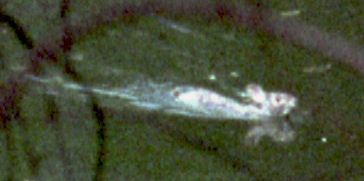
K&R!!!
defacto7
(13,485 posts)Rhiannon12866
(205,993 posts)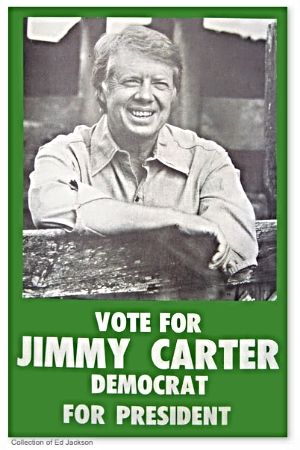

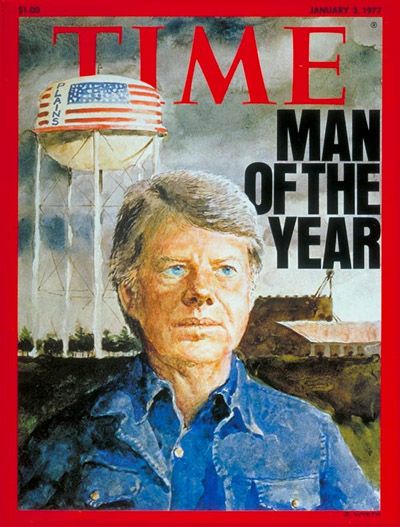
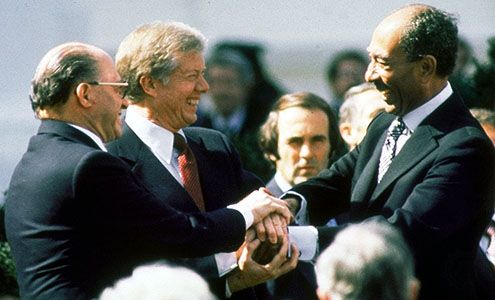
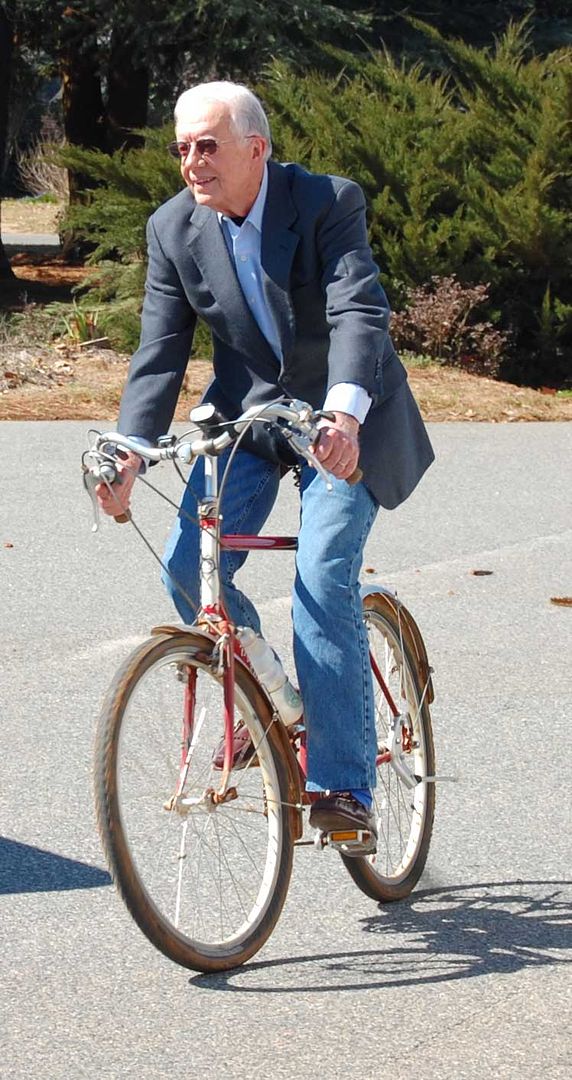
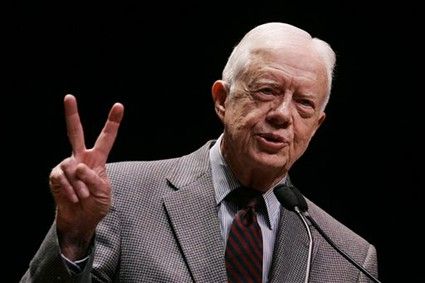
democrank
(11,103 posts)What a humble, principled man he is.
Response to OmahaBlueDog (Original post)
Name removed Message auto-removed
dipsydoodle
(42,239 posts)devoid of the trapping of any attempts to appear to be a Hollywood film star.
Good man.
adirondacker
(2,921 posts)Sherman A1
(38,958 posts)Onlooker
(5,636 posts)He began deregulation, and destroyed the trucking unions, which have led to lower wages all around. His anti-union policies ultimately led to blue collar workers becoming Reagan Democrats, which set us on a path that even Clinton and Obama have not yet succeeded in turning around. He also had no urban policy, so did nothing to further civil rights and very little on woman's rights.
roamer65
(36,747 posts)He doesn't mince words and you know right where he stands on an issue. I would love to see him run for his second term.
Berlum
(7,044 posts)bemildred
(90,061 posts)You want to read about poiitics and Carter:
http://www.amazon.com/Liberty-Under-Siege-American-1976-1988/dp/1879957116
DinahMoeHum
(21,809 posts)I had turned legal voting age just 2 years earlier.
![]()
Laelth
(32,017 posts)-Laelth
pacalo
(24,721 posts)jwirr
(39,215 posts)99Forever
(14,524 posts).. has claimed to be and isn't.
Progressive dog
(6,918 posts)inherited a mess and left it better.